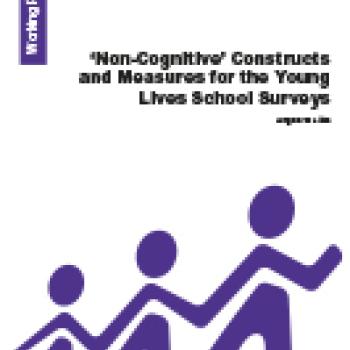
In their studies of academic achievement, the Young Lives school survey research teams wish to include a range of psychosocial measures. This working paper prepares the ground for this work. It reviews international literature on psychosocial constructs and measures, often referred to as ‘non-cognitive’ factors, in the determination of academic achievement and longer term outcomes. The review focuses on five recent meta reviews, and also describes a number of studies in low- and middle-income countries not included in these meta reviews, but which have relevance for Young Lives research. It emphasises the importance of linking constructs to theory as well as to measures, and raises a number of measurement and procedural issues. Based on evidence to date, the paper proposes a model of the role of non-cognitive factors and learning outcomes. Finally, it provides guidance on the pre-pilot work.

In their studies of academic achievement, the Young Lives school survey research teams wish to include a range of psychosocial measures. This working paper prepares the ground for this work. It reviews international literature on psychosocial constructs and measures, often referred to as ‘non-cognitive’ factors, in the determination of academic achievement and longer term outcomes. The review focuses on five recent meta reviews, and also describes a number of studies in low- and middle-income countries not included in these meta reviews, but which have relevance for Young Lives research. It emphasises the importance of linking constructs to theory as well as to measures, and raises a number of measurement and procedural issues. Based on evidence to date, the paper proposes a model of the role of non-cognitive factors and learning outcomes. Finally, it provides guidance on the pre-pilot work.

